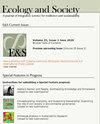新西兰农村地区气候变化信念的异质性
IF 3.2
2区 社会学
Q1 ECOLOGY
引用次数: 0
摘要
在本文中,我们通过对新西兰农民、林农、种植者和生活街区所有者的大规模调查,提出了关于气候信念异质性的新证据。使用灵活的条件矩方法,我们估计了气候变化信念的人际离散性,这为气候变化信念的异质性提供了一个直接的度量。我们的研究结果表明,女性、年轻的受访者、家庭农业历史较少的农民、受过高等教育的受访者以及那些对社交媒体信任度较低的受访者更有可能相信气候变化。此外,男性(年轻人和老年人)、受教育程度较低的人以及信任社交媒体的人的信仰更加多样化。我们的研究结果提供了新的见解,允许政府和非政府组织设计和沟通政策,以减少气候变化信念的异质性,这应该支持采取气候变化行动。本文章由计算机程序翻译,如有差异,请以英文原文为准。
Heterogeneity in climate change beliefs across New Zealand’s rural sector
In this paper we present novel evidence about heterogeneity in climate beliefs using a large-scale survey of farmers, foresters, growers, and lifestyle block owners in New Zealand. Using a flexible, conditional-moments approach, we estimate the interpersonal dispersion in climate change beliefs conditional on individual characteristics, which provides a direct measure of the heterogeneity in beliefs about climate change. Our results show that women, younger respondents, farmers with less family farming history, higher educated respondents, and those respondents who are less trusting in social media are more likely to believe in climate change. Further, beliefs are more heterogeneous among males (young and old), the less educated, and those who trust social media. Our results offer new insights allowing governments and NGOs to design and communicate policies to reduce the heterogeneity in climate change beliefs, which should support the uptake of climate change actions.
求助全文
通过发布文献求助,成功后即可免费获取论文全文。
去求助
来源期刊

Ecology and Society
环境科学-生态学
CiteScore
6.20
自引率
4.90%
发文量
109
审稿时长
3 months
期刊介绍:
Ecology and Society is an electronic, peer-reviewed, multi-disciplinary journal devoted to the rapid dissemination of current research. Manuscript submission, peer review, and publication are all handled on the Internet. Software developed for the journal automates all clerical steps during peer review, facilitates a double-blind peer review process, and allows authors and editors to follow the progress of peer review on the Internet. As articles are accepted, they are published in an "Issue in Progress." At four month intervals the Issue-in-Progress is declared a New Issue, and subscribers receive the Table of Contents of the issue via email. Our turn-around time (submission to publication) averages around 350 days.
We encourage publication of special features. Special features are comprised of a set of manuscripts that address a single theme, and include an introductory and summary manuscript. The individual contributions are published in regular issues, and the special feature manuscripts are linked through a table of contents and announced on the journal''s main page.
The journal seeks papers that are novel, integrative and written in a way that is accessible to a wide audience that includes an array of disciplines from the natural sciences, social sciences, and the humanities concerned with the relationship between society and the life-supporting ecosystems on which human wellbeing ultimately depends.
 求助内容:
求助内容: 应助结果提醒方式:
应助结果提醒方式:


